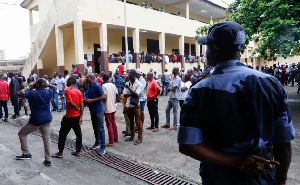By Dr. Michael J.K. Bokor
Monday, August 11, 2014
My good friends, in the light of the perennial industrial actions by organized labour (and considering the implications of the one by the Polytechnic Teachers Association of Ghana, POTAG, and the University teachers Association of Ghana, UTAG, in respect of non-payment of book and research allowance), I have been brooding over some issues concerning how our democracy is being run (or how it is not being used to solve existential problems and why the politicians are jostling for attention mostly because of the high stakes that they alone think they have in it).
First, let's take the spate of industrial actions to comment on. It is unfortunate that organized labour has to perennially lay down tools or take to the streets to protest against their conditions of service. What has happened over the past few weeks or months is a clear indication that this ritual of strikes and street demonstrations has been accepted as a necessary "evil" or the only language that employers, particular the government, understand. And that language really hurts productivity when used.
Take the POTAG strike action, for instance. Then, add the UTAG one to it while looking over your shoulders to feel the hot air that the Ghana Medical Association is breathing. Others are also not deterred by anything and will lay down their tools at will just because they feel unfulfilled at their workplaces.
In the case of POTAG and UTAG, the issue is simple: the government says it has abolished the book and research allowances paid to individual POTAG/UTAG members and replaced it with a National Research Fund whose administration will instill discipline, rigour, and accountability into the allocation of public funds. The government has a good reason for introducing this new measure to centralize the administration of the funds and ensure that there is value-for-money. In other words, the change means that prospective beneficiaries have to provide evidence to prove that they have any research agenda and how that agenda will be prosecuted to the benefit of the country.
In the existing system, there is little to prove that the money is being used to purchase books required for improved teaching and learning or for research activities beneficial to the tax-payers. We know that the "book and research allowance" has turned out to be an additional "earned income credit" for the lecturers in POTAG/UTAG). Too bad for Ghana. Stiff opposition to the government's laudable and innovative measure has stalled activities at the polytechnics and is threatening others at the universities too.
I blame the government for all this impasse. Apparently, in a democracy that is designed to work, the measure shouldn't have been taken by the Executive arm of government alone. It would have been a collaborative effort between the Executive and the Legislature to give it the bite it needs.
In other words, the Executive should have formulated a bill on the National Research Fund and forwarded it to Parliament for deliberation and consequent passing into legislation for enforcement. In that sense, it will have the force of law and not be seen only as a kind of punishment being inflicted by an insensitive government. Once it becomes law, no one can flout it and go unpunished.
There are many other instances, such as all that rot at GYEEDA, SUBAH, and many others. Because the Executive went it alone, it didn't give any legal bite to those endeavours. It is high time such a unilateral move were stopped so our democracy can function better.
I urge the Executive to contemplate issues and consider introducing bills on them for Parliament to act on. It must not go it alone, even though operating in an Executive Presidential system. In other countries (such as the United States), the involvement of the Legislature in anything that has an all-encompassing national quality is sought by the Executive and issues handled collaboratively so they could be grounded in appropriate legislation. Once it is the law, anybody who infringes it must brace up for the consequences.
In Ghana too, very important wide-ranging measures intended by the Executive must go through the mill and be legislated on for enforcement. Not until that approach is taken, all the measures being taken by the Executive will be easily flouted and nothing can be done to implement those measures. As is happening now, the government is being forced to bend backwards, especially when political capital begins being attached to issues. And for fear of losing prospective votes, the government will succumb. Then, nothing gets changed.
Let us learn to do the right thing so important changes can be given legal backing and enforced so that discipline can be instilled in our national affairs. Anybody listening at all?
For all that it entails, the position taken by POTAG/UTAG on the book and research allowance is untenable. A friend quickly objected to my stance, offering this perspective: There are a lot of examples elsewhere for us to learn from. In countries where they have similar research fund, it is not something that is announced over night. It is a carefully thought through process. And such research funds are directed towards strategic areas of the economy. You have the tri-council research fund in Canada.
A national research fund should be strategic in nature and directed toward key sector. That is why some are against the substitution of the book and research allowance with a national research fund. Book and research allowance is directed toward the professional development of the academic staff of the public universities. And that should be distinguished from a national research fund which should target key sectors. Such national research fund should be available to any researcher who demonstrate the capability to conduct research on the targeted sectors and not to academic staff of public universities alone. Lecturers have never been against the establishment of a research fund. Just recently, a professor of physics who presented his inaugural lecture at the University of Cape Coast has the establishment of a national research fund as his key recommendation.
As we speak now, there is no policy in place for the so-called national research fund that government said it had established. How do you claim to put so much money into a fund you do not even have any policy for its administration? This is a recipe for corruption as we have seen in SUBA and GYEEDA. And we all know how the GETFund and other government scholarships have been used over the years and we should be guided by lessons learnt from them.
I don't want to go into the argument that lecturers don't conduct any research and therefore don't deserve a research allowance. We have had a lot of professors in Ghana over the years. Are we saying they don't conduct research but got promoted to those ranks? Since the debate on the book and research allowance emerged various government spokespersons have tried to whip public sentiments against lecturers. I think that is not the way to go.
The book and research allowance paid to lecturers currently was negotiated in 1992 when the then government saw the need for it. It thus became part of the conditions of service of the academic staff since then. So government doesn't get up one day to say am cancelling this allowance. It doesn't work like that. We need to take governance seriously if we really want to grow our democracy.
And I responded smartly too, telling him and those holding similar opinions that even though I can see where they are coming from, I will still opt for the abolition of the so-called book and research allowance as currently configured and paid to members of UTAG and POTAG. If it was instituted in 1992 when there was need for it, what prevents us today from re-configuring it when there is another need for it? The exigencies of yesteryears have given way to new ones that this book and research allowance must be tailored to meet. The claim that the allowance is for "professional development" makes me laugh a lot because it is a misnomer. Tell me who has used that allowance for anything like "professional development" and I may change my stance.
Talking about "professional development" is just a euphemistic way of hiding the truth and preventing government from supplanting that allowance with the broad-based National Research Fund. Which of these beneficiaries of the book and research allowance has had any professional development through that allowance? Where and when to prove that the allowance has been judiciously used to procure books and to do research (to improve standards)?
If the POTAG/UTAG members are really interested in putting their expertise to good use for the benefit of the country, they should go for the National Research Fund and stop bothering the system.
I shall return...
• E-mail: mjbokor@yahoo.com
• Join me on Facebook at: http://www.facebook.com/mjkbokor to continue the conversation.
Opinions of Wednesday, 13 August 2014
Columnist: Bokor, Michael J. K.














